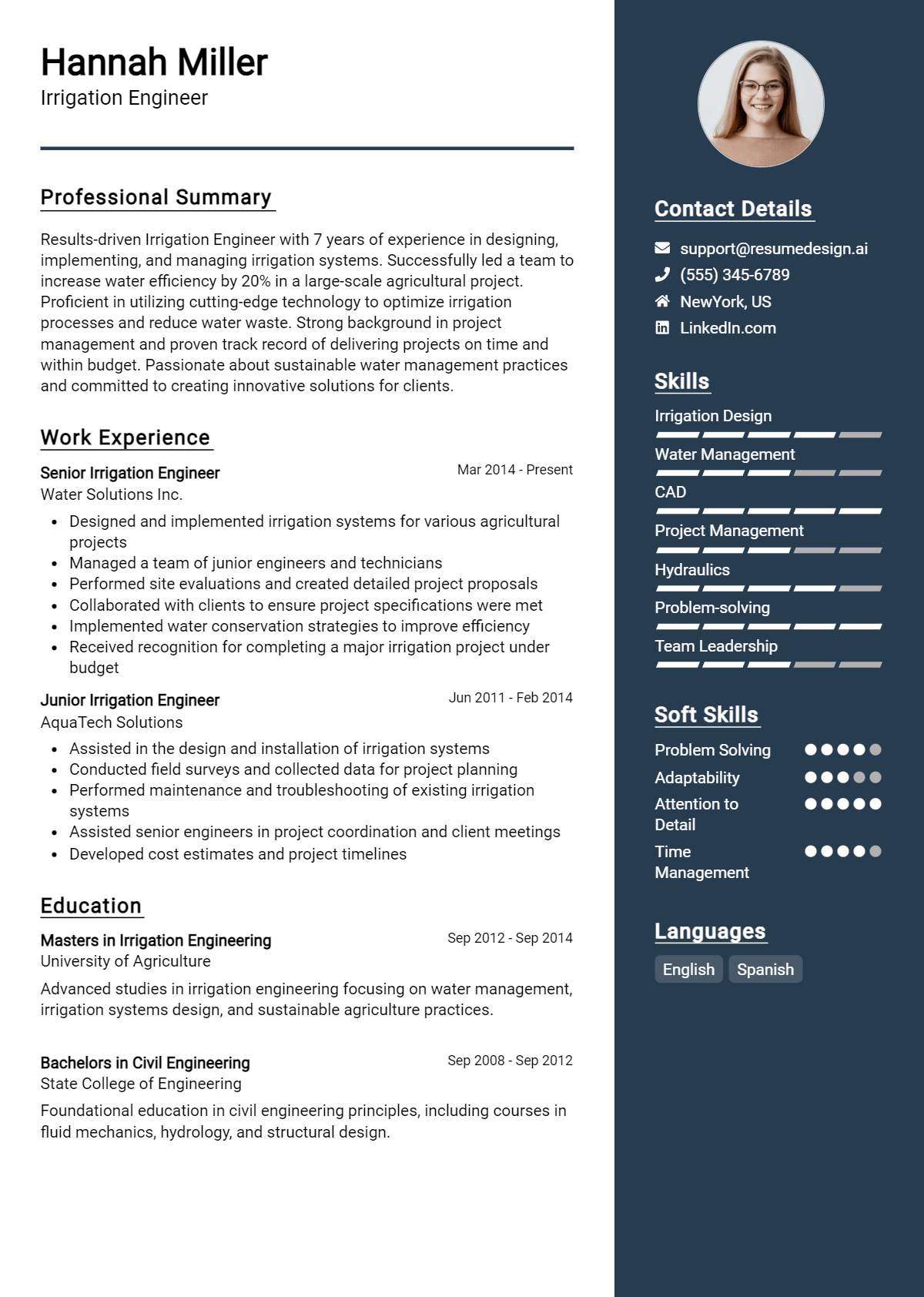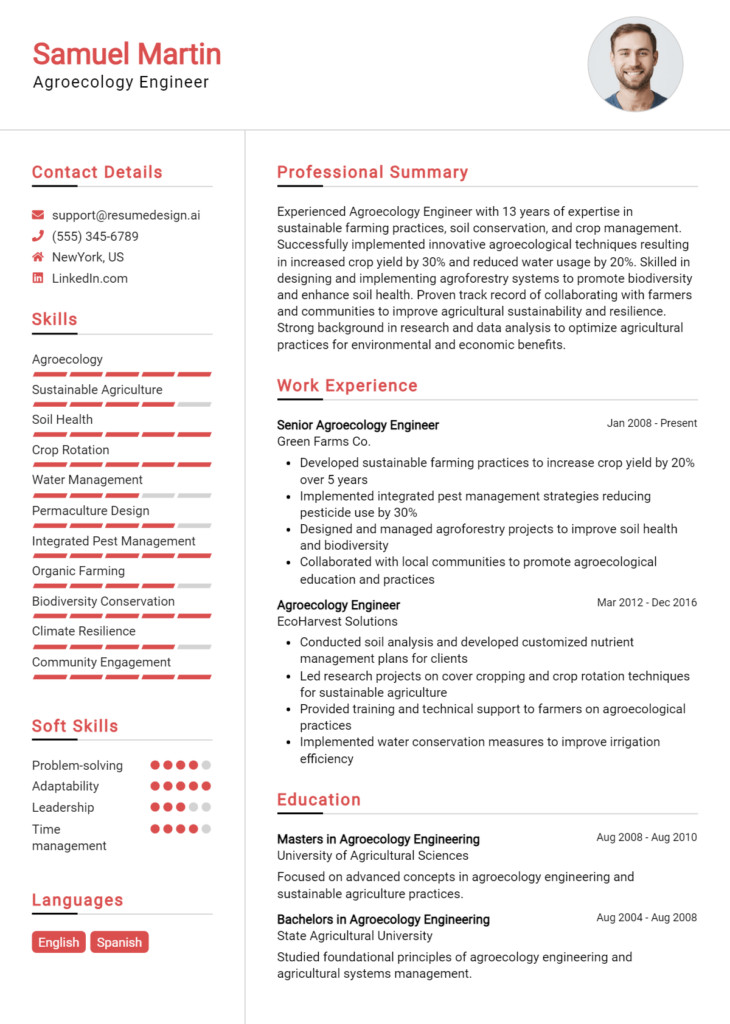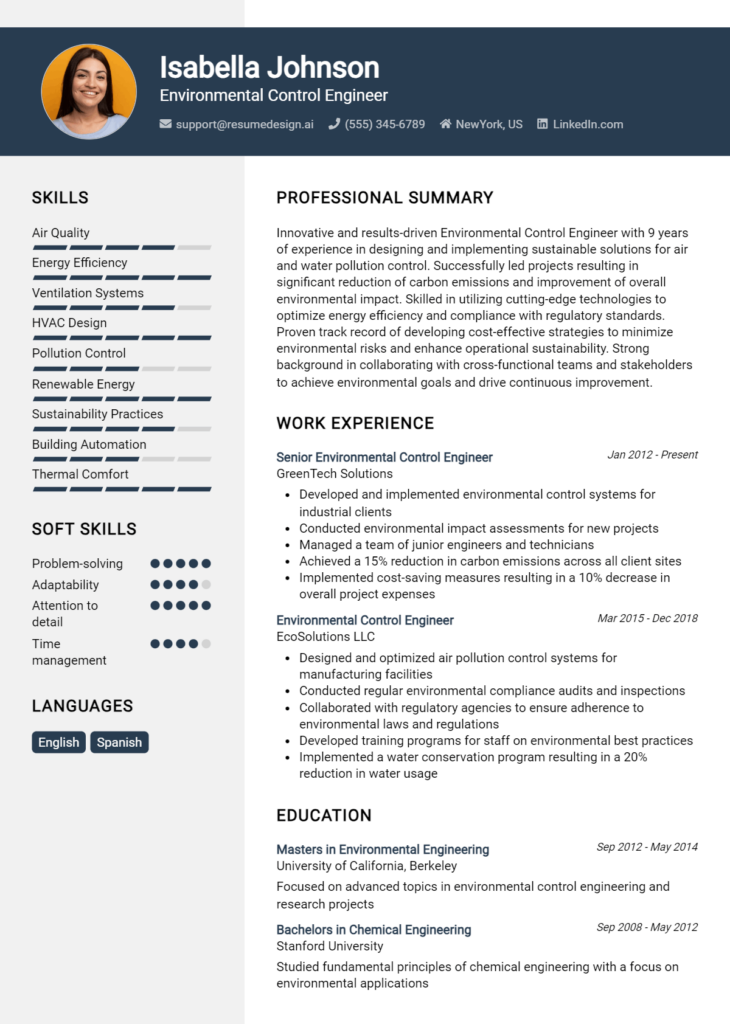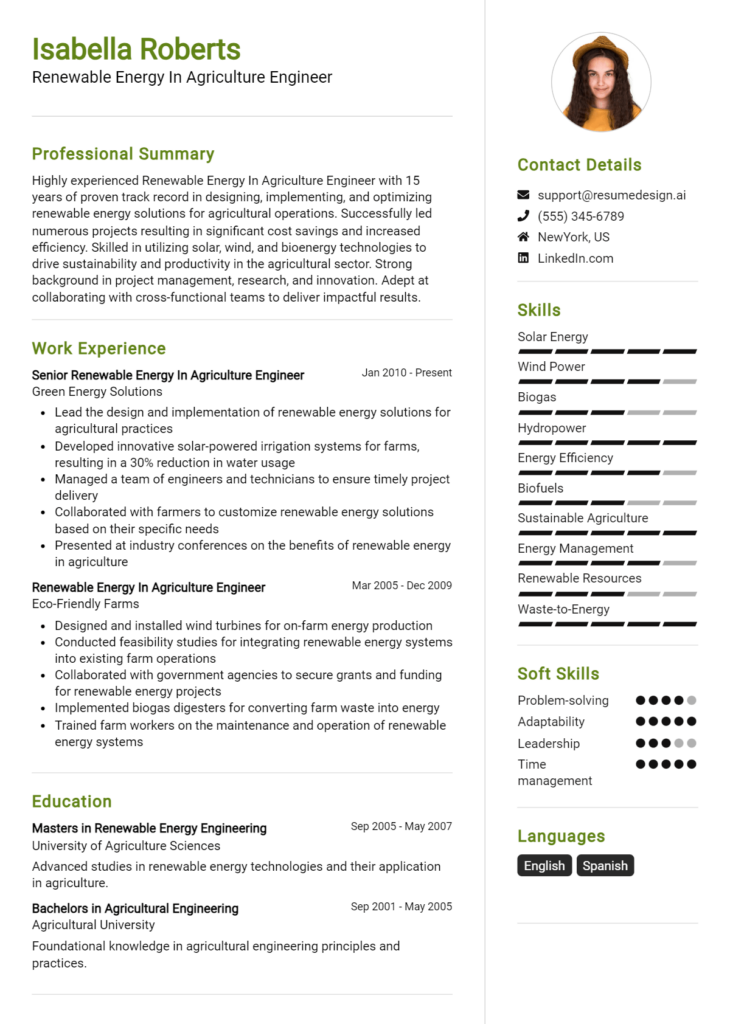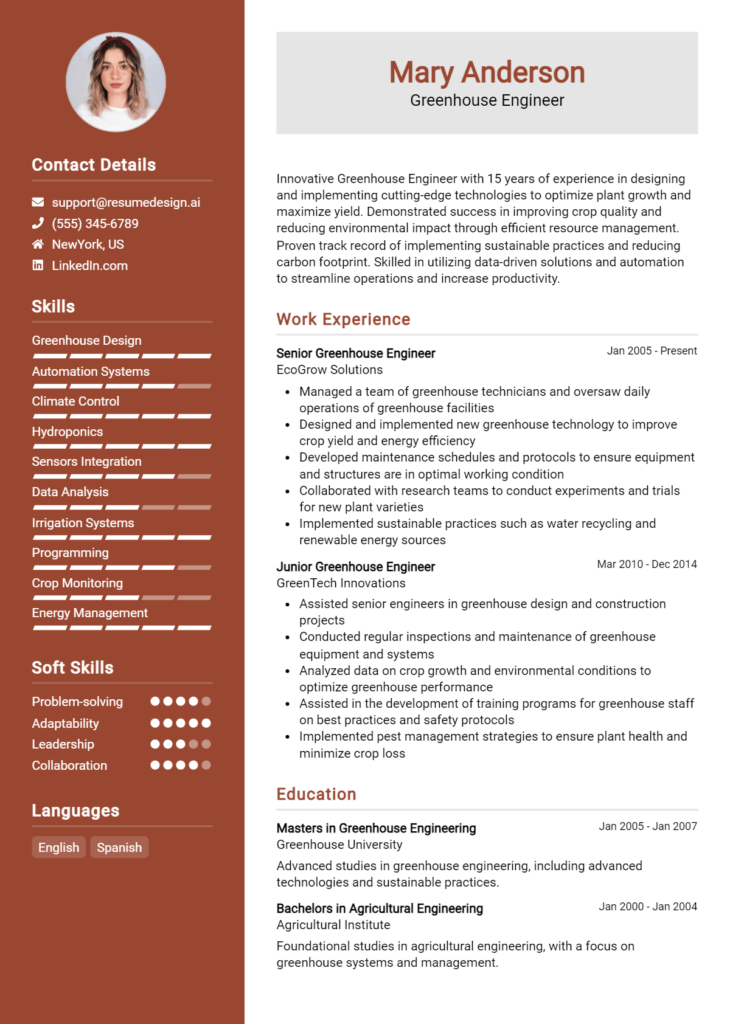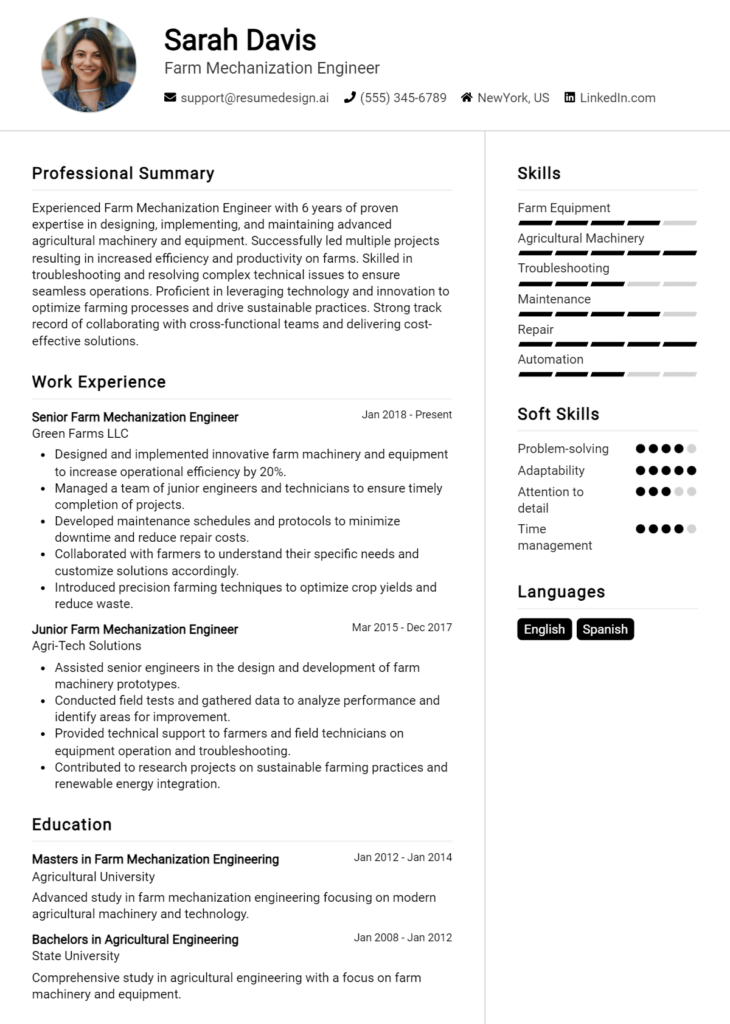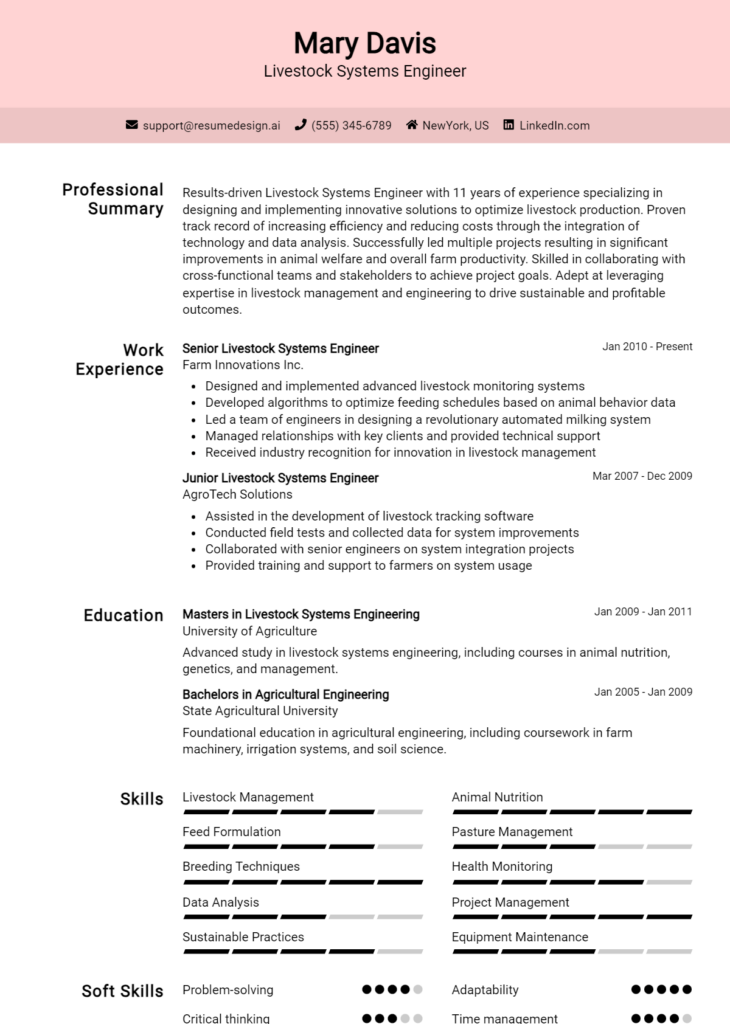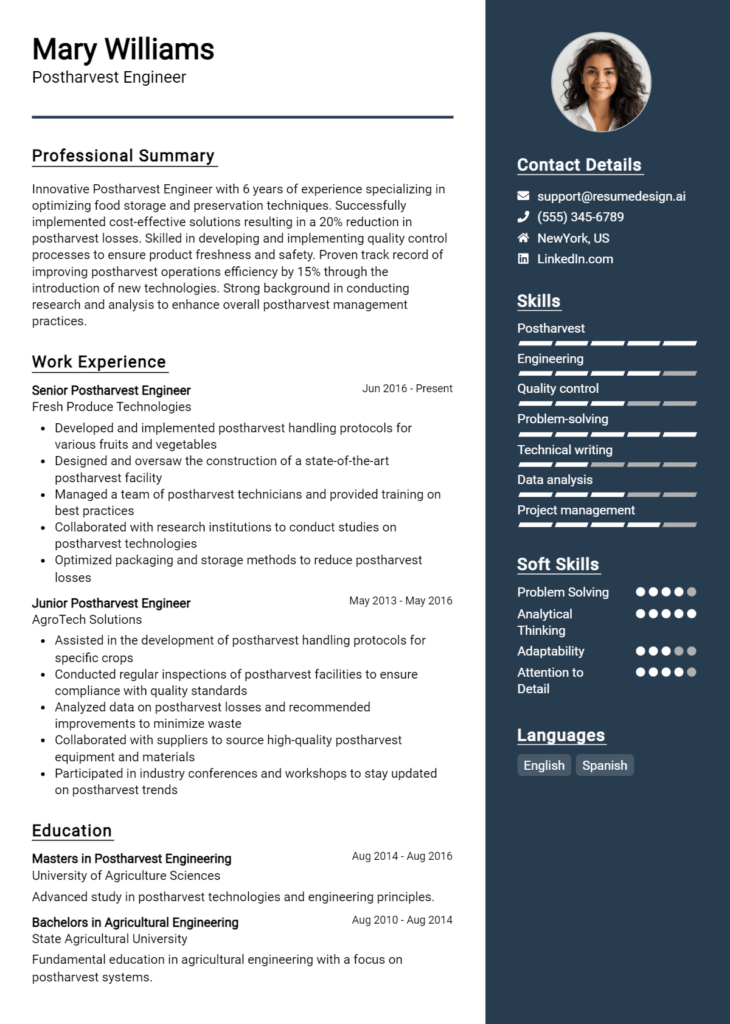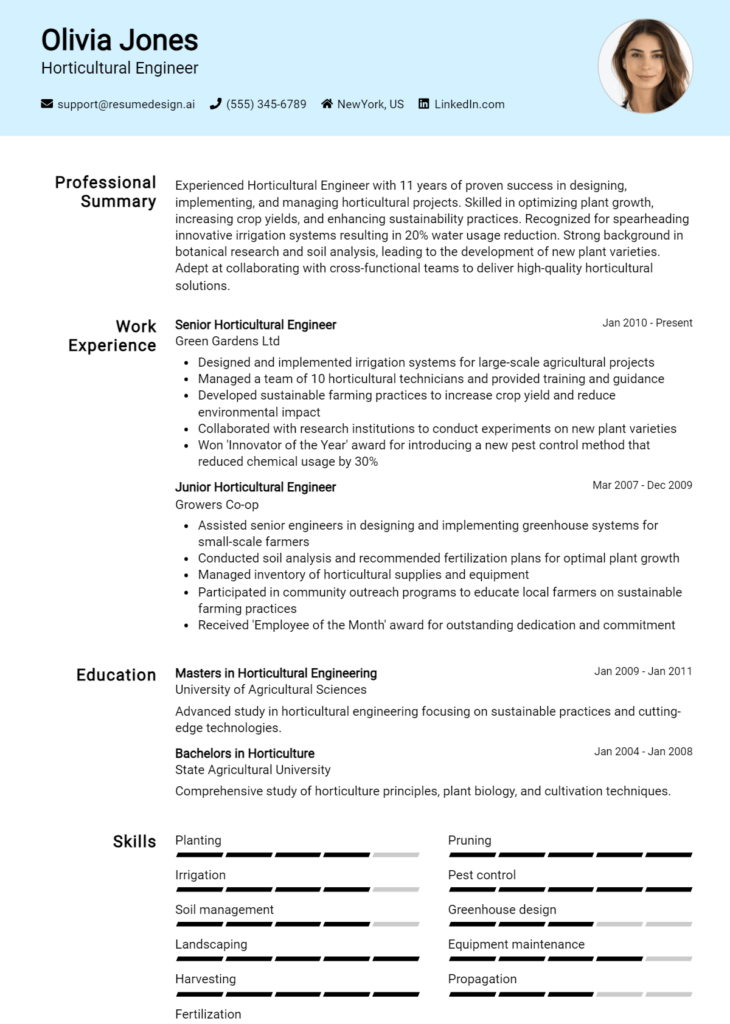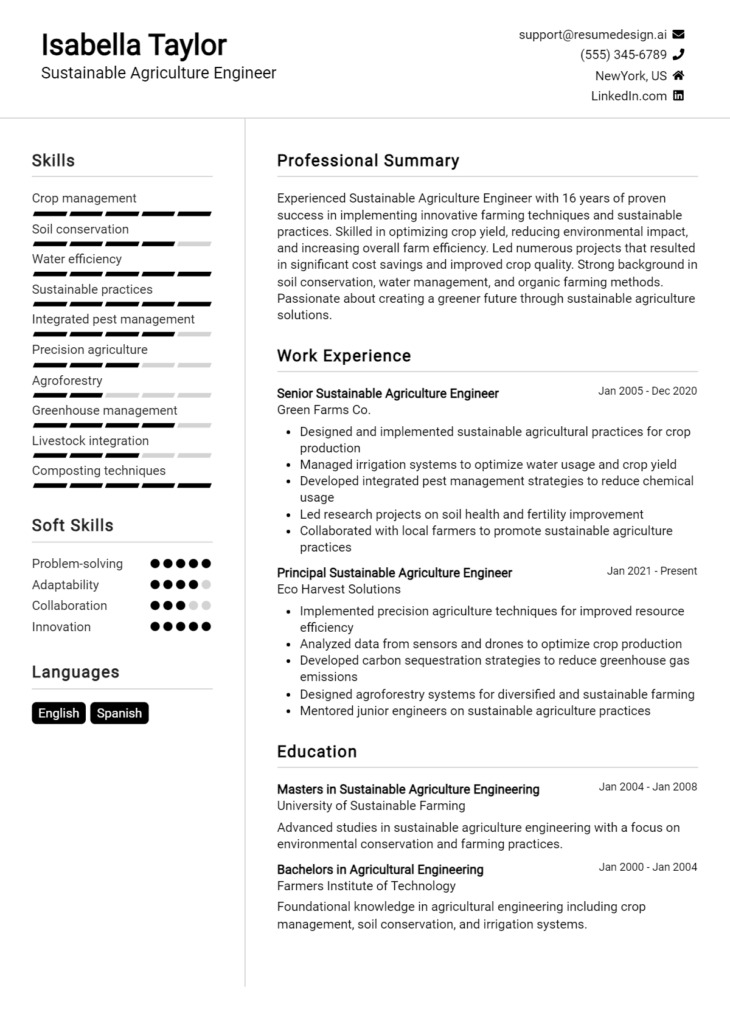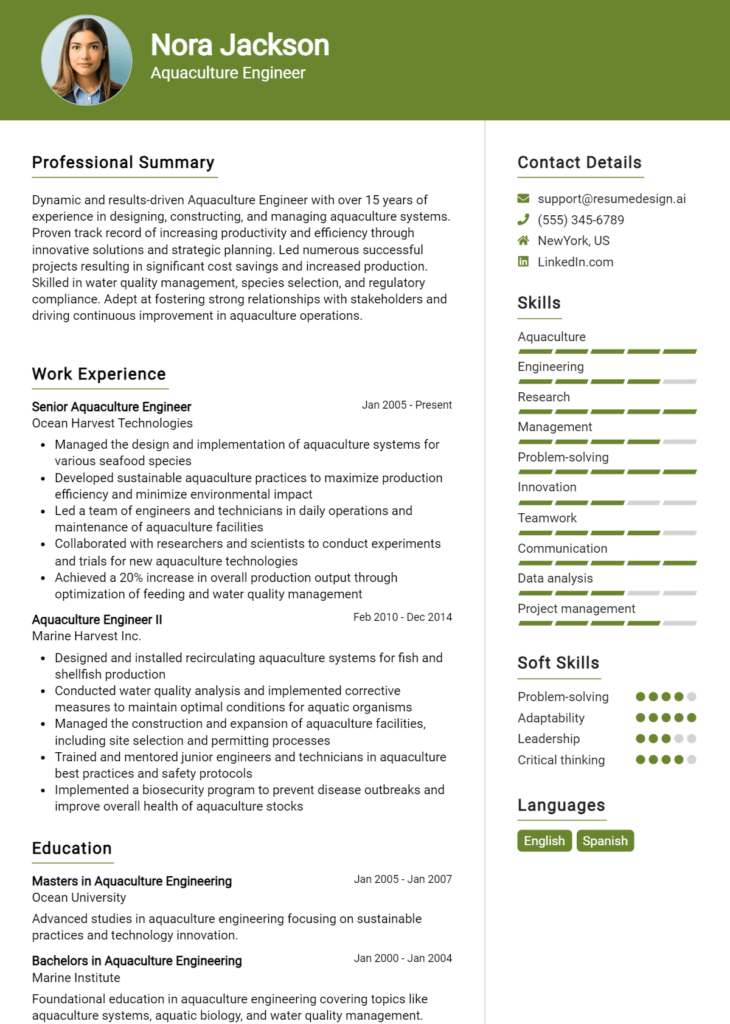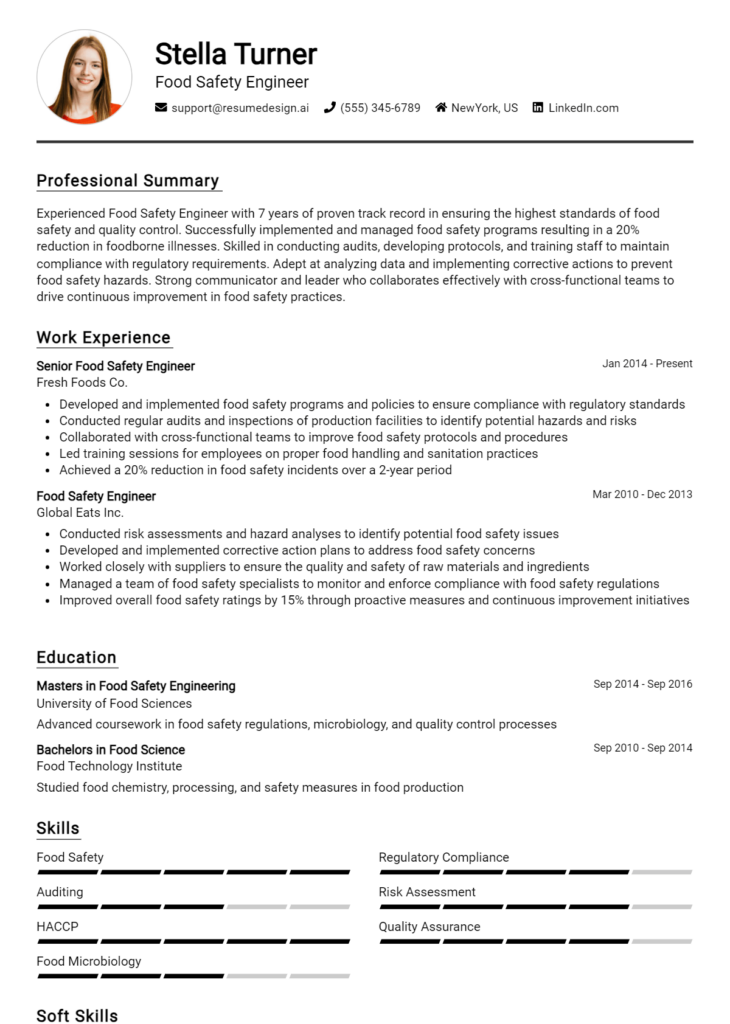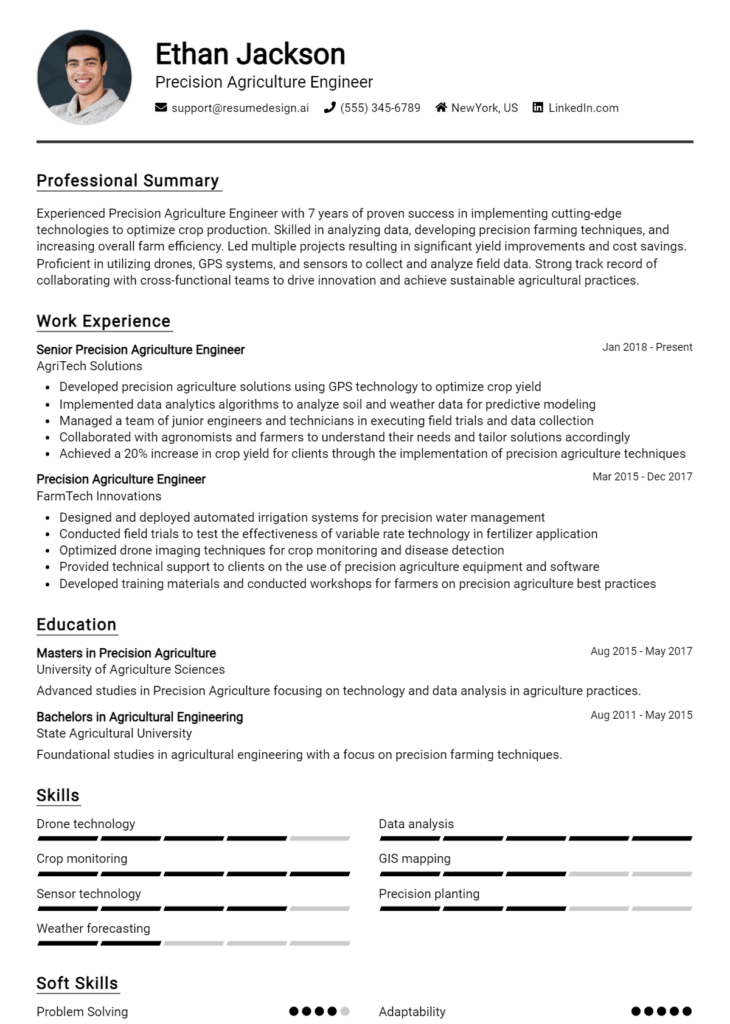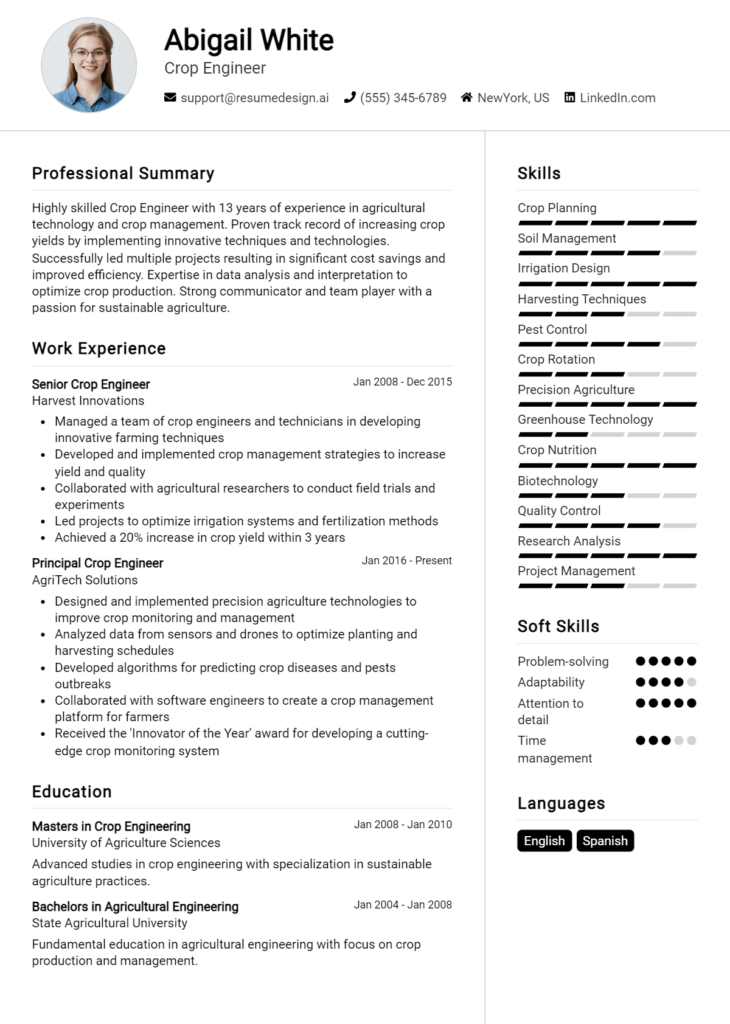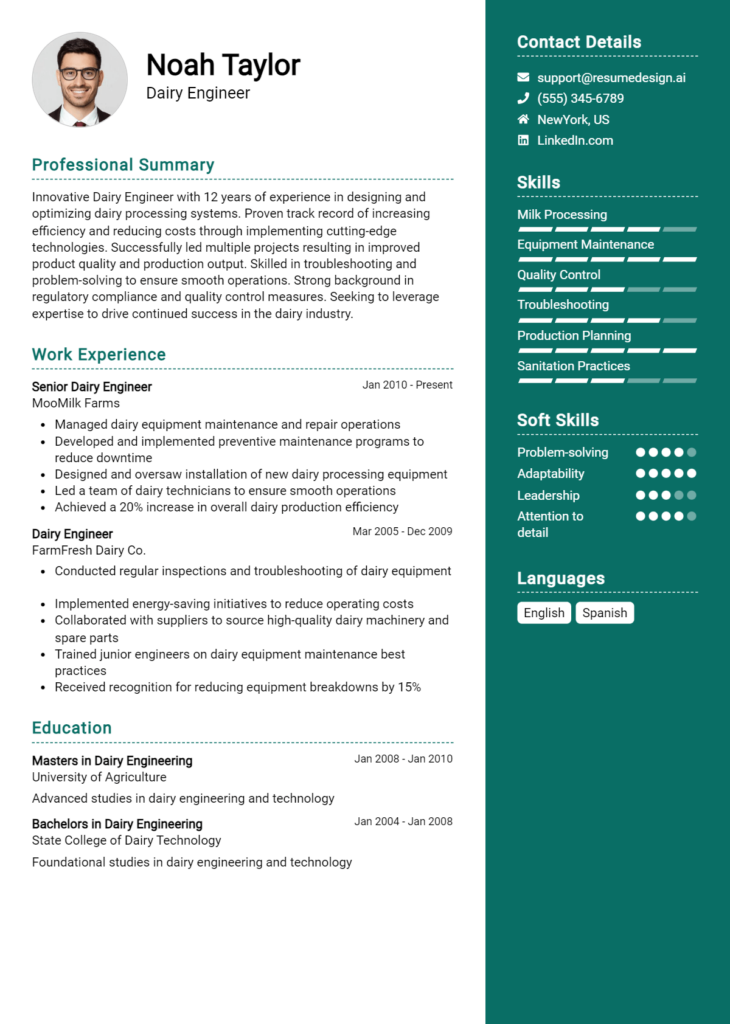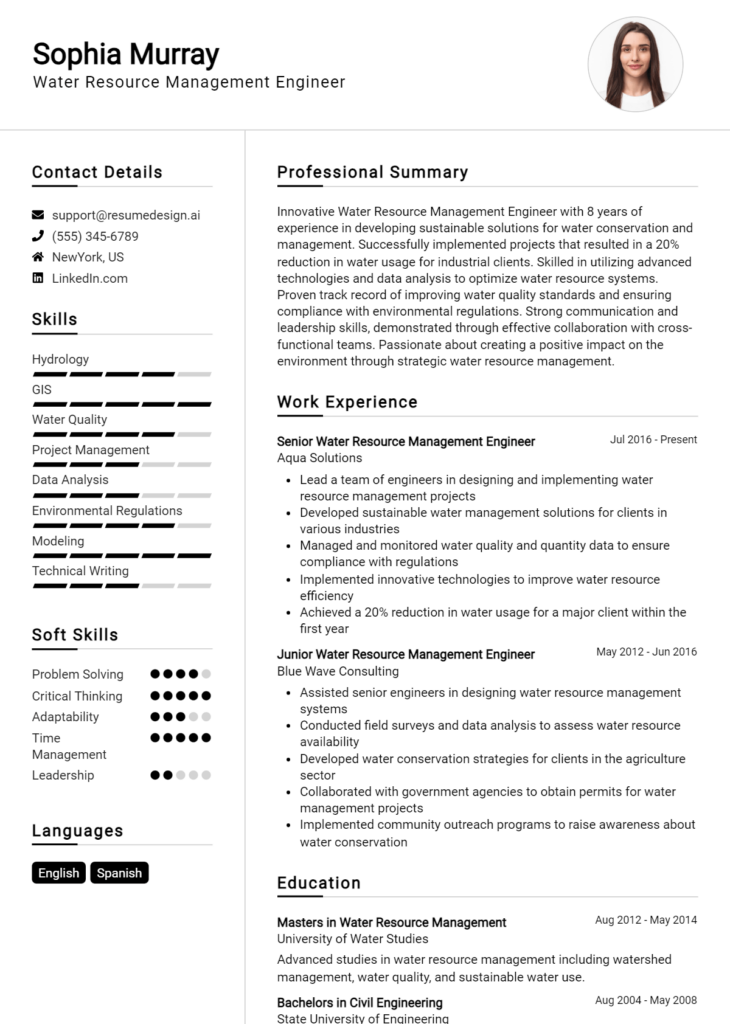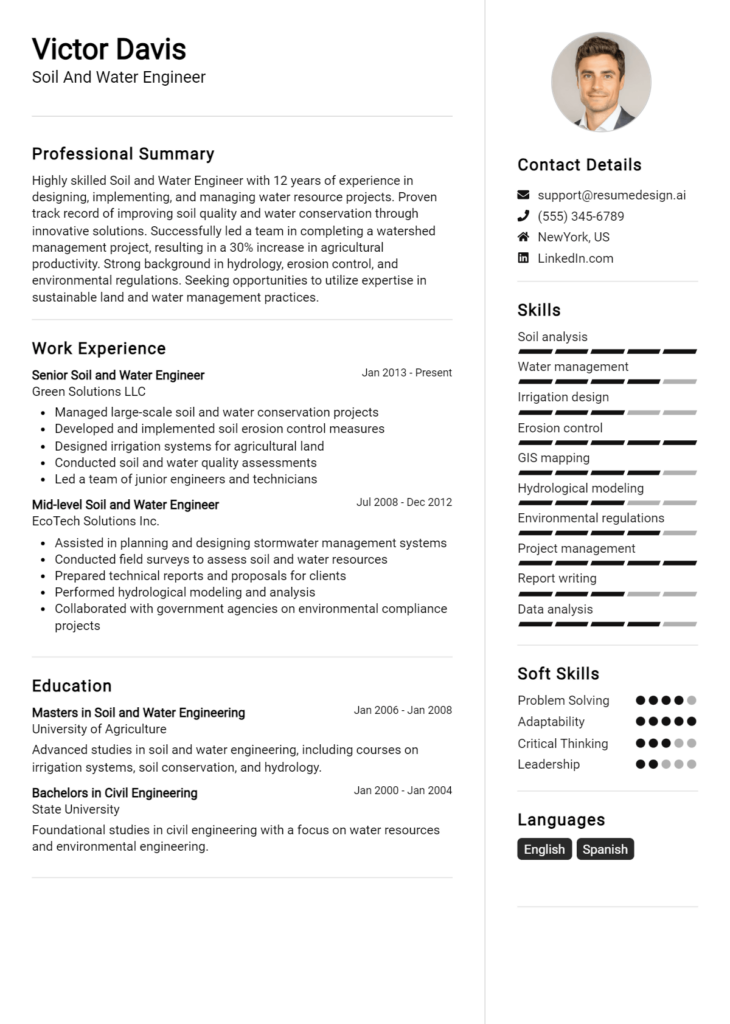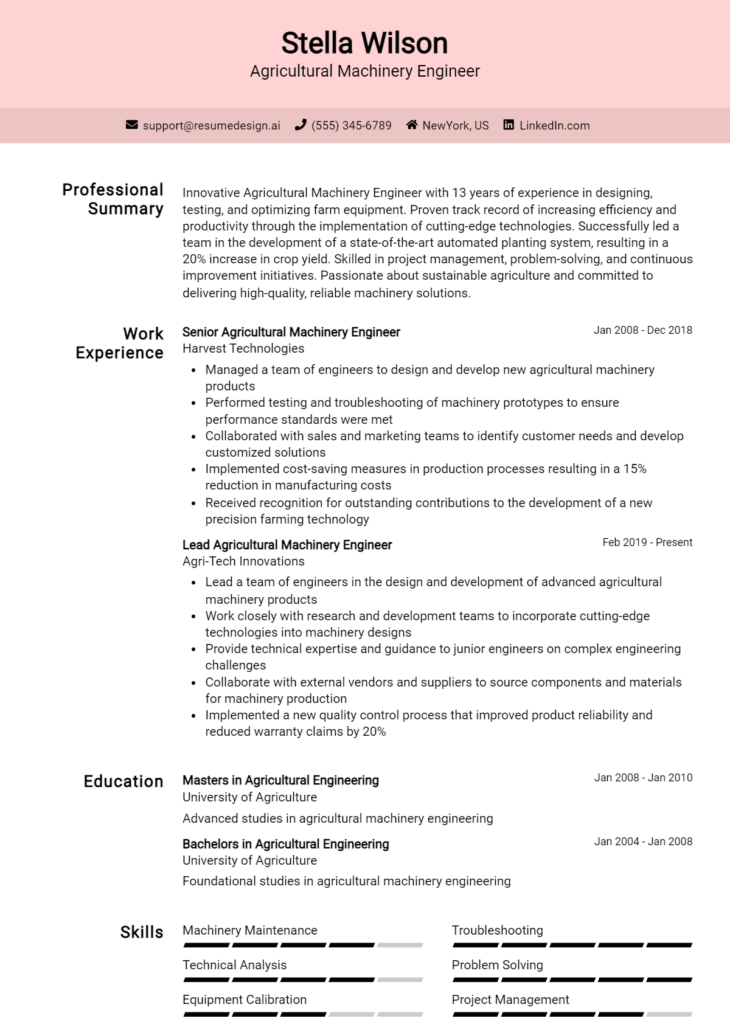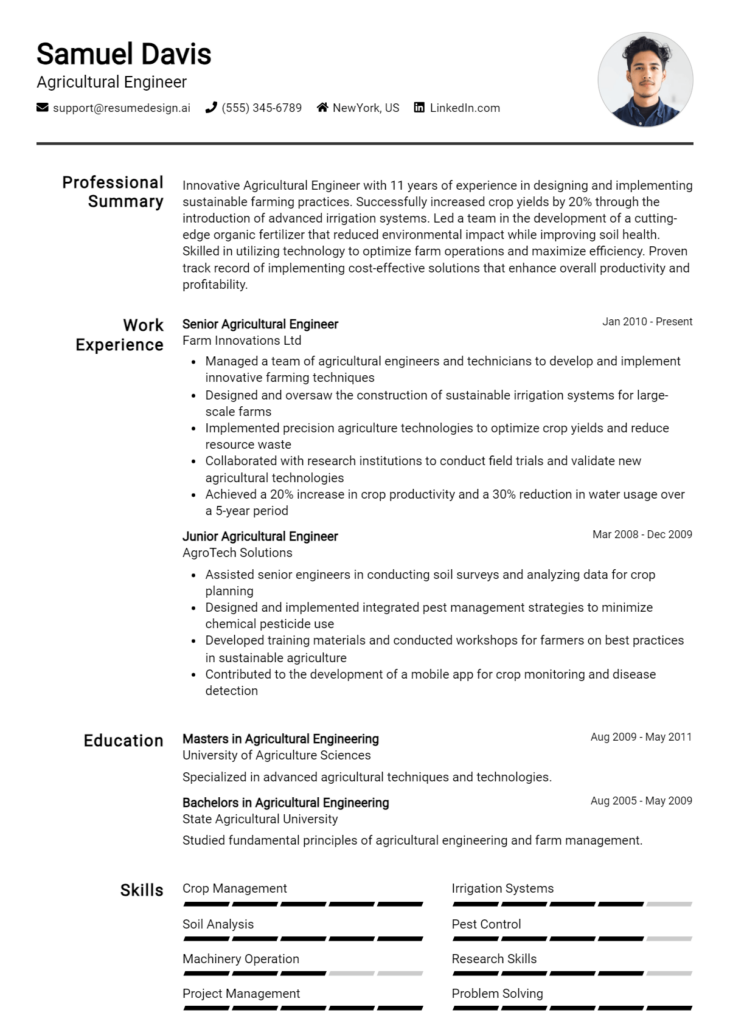Irrigation Engineer Core Responsibilities
An Irrigation Engineer plays a crucial role in designing, implementing, and maintaining irrigation systems that optimize water usage for agricultural and landscape projects. This position requires strong technical skills in hydraulics, soil science, and system design, along with problem-solving abilities to address operational challenges. By collaborating with agronomists, environmental scientists, and project managers, the Irrigation Engineer ensures that water resources are used efficiently, contributing to the organization’s sustainability goals. A well-structured resume highlighting these qualifications can significantly enhance career prospects.
Common Responsibilities Listed on Irrigation Engineer Resume
- Design and develop efficient irrigation systems tailored to specific crops and landscapes.
- Conduct site assessments to determine water availability and soil conditions.
- Oversee the installation and maintenance of irrigation equipment and infrastructure.
- Monitor system performance and make adjustments to optimize water usage.
- Collaborate with multidisciplinary teams to integrate irrigation solutions into larger projects.
- Prepare technical reports and documentation for irrigation projects.
- Ensure compliance with environmental regulations and sustainability practices.
- Provide training and support to staff on irrigation techniques and technologies.
- Evaluate new technologies and methods for improving irrigation efficiency.
- Manage project budgets and timelines related to irrigation systems.
- Conduct research on water conservation practices and their applicability.
High-Level Resume Tips for Irrigation Engineer Professionals
In the competitive field of irrigation engineering, a well-crafted resume serves as a crucial tool for professionals seeking to make a lasting impression on potential employers. Often the first glimpse a recruiter has of a candidate, a resume must effectively showcase both technical skills and notable achievements to stand out. It is not just a list of past jobs; rather, it is a narrative that reflects a candidate's expertise in designing and implementing effective irrigation systems, managing projects, and contributing to sustainable practices. This guide will provide practical and actionable resume tips specifically tailored for irrigation engineering professionals, ensuring that their resumes resonate with hiring managers and accurately represent their qualifications.
Top Resume Tips for Irrigation Engineer Professionals
- Tailor your resume to the job description by incorporating keywords and phrases that align with the specific requirements of the position.
- Highlight relevant experience in irrigation design, project management, and system maintenance to demonstrate your expertise in the field.
- Quantify your achievements by using metrics, such as the percentage of water savings achieved or the number of projects completed, to provide concrete evidence of your impact.
- Showcase industry-specific skills, such as knowledge of CAD software, hydraulic modeling, and environmental regulations, that are essential for an irrigation engineer.
- Include certifications and licenses relevant to irrigation engineering, such as Certified Irrigation Designer (CID) or Professional Engineer (PE) status, to enhance your credibility.
- Use a clean and professional format that is easy to read, ensuring that key information stands out to hiring managers.
- Incorporate a summary statement at the beginning of your resume that succinctly outlines your experience, skills, and career objectives.
- Provide examples of collaborative projects that demonstrate your ability to work effectively in teams, as irrigation engineering often involves multidisciplinary collaboration.
- Keep your resume concise, ideally one page, while ensuring it includes all relevant information without overwhelming the reader.
- Proofread carefully to eliminate any grammatical errors or typos, as attention to detail is critical in engineering roles.
By implementing these resume tips, irrigation engineering professionals can significantly increase their chances of landing a job in the field. A polished and targeted resume not only highlights a candidate's qualifications but also conveys their commitment to the profession and their readiness to contribute to innovative irrigation solutions. With a strong first impression, candidates can set themselves apart in a competitive job market.
Why Resume Headlines & Titles are Important for Irrigation Engineer
In the competitive field of irrigation engineering, having a well-crafted resume headline or title is crucial for standing out to hiring managers. A strong headline not only grabs attention but also serves as a concise summary of the candidate's key qualifications and experience. It should encapsulate the essence of what makes the applicant a strong fit for the role, allowing hiring managers to quickly assess their relevance. Crafting a headline that is both relevant and impactful can significantly enhance the chances of making a lasting impression, setting the tone for the rest of the resume.
Best Practices for Crafting Resume Headlines for Irrigation Engineer
- Keep it concise: Aim for one to two impactful phrases.
- Be role-specific: Tailor the headline to the irrigation engineering field.
- Highlight key achievements: Include notable certifications or accomplishments.
- Use strong action verbs: Start with dynamic words that convey expertise.
- Incorporate relevant keywords: Use industry-specific terminology to enhance searchability.
- Avoid jargon: Ensure the headline is easily understood by a broad audience.
- Showcase unique skills: Emphasize any specialized skills that set you apart.
- Make it engaging: Use language that reflects enthusiasm for the role.
Example Resume Headlines for Irrigation Engineer
Strong Resume Headlines
Innovative Irrigation Engineer with 8+ Years of Experience in Sustainable Water Management
Certified Irrigation Designer Specializing in Efficient Water Use and Conservation Strategies
Results-Driven Irrigation Engineer Focused on Enhancing Crop Yield through Advanced Irrigation Techniques
Weak Resume Headlines
Irrigation Engineer Looking for a Job
Experienced Professional in Water Management
The strong headlines are effective because they provide specific information about the candidate's qualifications, skills, and experience, making them relevant to the role of an irrigation engineer. They are engaging and use industry terminology that resonates with hiring managers. On the other hand, the weak headlines fail to impress because they are vague and non-specific, lacking any concrete details that would draw interest. A compelling headline should create a clear picture of the candidate's expertise and potential contributions to the organization.
Writing an Exceptional Irrigation Engineer Resume Summary
A well-crafted resume summary is essential for an Irrigation Engineer, as it serves as the first impression a hiring manager will have of a candidate. This brief yet powerful statement summarizes key skills, relevant experience, and noteworthy accomplishments, allowing the applicant to stand out in a competitive job market. A strong summary quickly captures the attention of hiring managers by directly addressing the specific requirements of the job role, making it imperative for candidates to present their qualifications concisely and impactfully. Tailoring the resume summary to the job description is crucial, as it demonstrates both interest and alignment with the organization's needs.
Best Practices for Writing a Irrigation Engineer Resume Summary
- Quantify achievements: Use numbers and statistics to showcase the impact of your work.
- Focus on relevant skills: Highlight skills that are directly related to irrigation engineering and the specific job you are applying for.
- Tailor the summary: Customize your summary for each job application to reflect the qualifications and experiences that best match the job description.
- Keep it concise: Aim for 2-4 sentences that capture the essence of your professional identity and career highlights.
- Use action verbs: Start sentences with strong action verbs to convey a sense of proactivity and accomplishment.
- Showcase certifications: Include relevant certifications or licenses that set you apart from other candidates.
- Highlight problem-solving skills: Emphasize your ability to address challenges in irrigation projects and improve efficiency.
- Maintain professionalism: Use a formal tone and avoid jargon that may not be understood by all hiring managers.
Example Irrigation Engineer Resume Summaries
Strong Resume Summaries
Results-driven Irrigation Engineer with over 7 years of experience in designing and implementing efficient irrigation systems for agricultural and landscape projects. Successfully reduced water consumption by 30% through innovative design solutions, leading to significant cost savings for clients.
Detail-oriented Irrigation Engineer with a proven track record of managing projects exceeding $1M, specializing in precision irrigation technologies. Successfully increased crop yields by 25% through the development of customized irrigation plans and effective resource management.
Dedicated Irrigation Engineer with expertise in hydraulic modeling and water resource management. Developed and executed a comprehensive irrigation system that improved water delivery efficiency by 40% for a large-scale farming operation.
Weak Resume Summaries
Irrigation Engineer with some experience in the field. Looking for a new opportunity to grow professionally.
Skilled engineer with a background in irrigation. I have worked on a few projects and am eager to learn more.
The strong resume summaries effectively highlight specific achievements and quantifiable results, demonstrating the candidate's expertise and impact in the irrigation engineering field. They provide concrete examples of how the applicant has contributed to previous projects, showcasing the skills and experience that are directly relevant to the job role. In contrast, the weak summaries are vague and fail to convey any meaningful accomplishments or specialized skills, making it difficult for hiring managers to gauge the candidate's qualifications or potential fit for the position.
Work Experience Section for Irrigation Engineer Resume
The work experience section of an Irrigation Engineer resume is critical as it serves as a platform to showcase the candidate's technical skills, project management capabilities, and ability to deliver high-quality irrigation solutions. This section not only highlights the hands-on experience gained in various projects but also demonstrates the candidate's proficiency in implementing industry standards and best practices. By quantifying achievements and aligning their experience with the specific requirements of the irrigation engineering field, candidates can effectively communicate their value to potential employers.
Best Practices for Irrigation Engineer Work Experience
- Focus on specific irrigation projects and technologies utilized.
- Quantify achievements using metrics such as cost savings, efficiency improvements, or project timelines.
- Highlight leadership roles and team management experiences to demonstrate collaboration skills.
- Include details about software or tools used in irrigation design and implementation.
- Emphasize compliance with environmental regulations and sustainability practices.
- Tailor descriptions to match industry standards and job descriptions.
- Use action verbs to convey proactive involvement in projects.
- Showcase any certifications or specialized training relevant to irrigation engineering.
Example Work Experiences for Irrigation Engineer
Strong Experiences
- Led a team of 5 engineers to design a state-of-the-art drip irrigation system that reduced water usage by 30%, saving the client $50,000 annually.
- Successfully managed a $1 million irrigation project from inception to completion, ensuring delivery three months ahead of schedule while maintaining compliance with all regulatory standards.
- Implemented a new irrigation scheduling software that increased crop yield by 15% through optimized water usage and precise application timing.
- Collaborated with agronomists and environmental specialists to develop sustainable irrigation practices that improved soil health and reduced runoff by 25%.
Weak Experiences
- Worked on various irrigation projects without specifying duties or outcomes.
- Assisted in irrigation planning and design but did not quantify contributions or results.
- Participated in team meetings and discussions about irrigation strategies.
- Gained experience in irrigation engineering through internships without detailing specific tasks or achievements.
The examples categorized as strong demonstrate clear, quantifiable outcomes and specific technical achievements that convey the candidate's expertise and leadership abilities. In contrast, the weak examples lack detail and measurable impact, making it difficult for potential employers to gauge the candidate's contributions or skills relevant to the field of irrigation engineering. Strong experiences clearly connect the candidate's work to tangible results, while weak experiences remain vague and unimpressive.
Education and Certifications Section for Irrigation Engineer Resume
The education and certifications section in an Irrigation Engineer resume is crucial as it serves as a testament to the candidate's academic foundation and expertise in the field. This section not only showcases relevant degrees and specialized training, but also emphasizes industry-recognized certifications that validate the candidate's skills and knowledge. By including pertinent coursework and ongoing educational endeavors, candidates can enhance their credibility and demonstrate a commitment to continuous learning, which is vital in a field that evolves with new technologies and methodologies.
Best Practices for Irrigation Engineer Education and Certifications
- List degrees in a chronological order, starting with the most recent.
- Include relevant coursework that showcases your expertise in irrigation design, water resource management, and soil science.
- Highlight industry-recognized certifications, such as Certified Irrigation Designer (CID) or Certified Irrigation Contractor (CIC).
- Detail any specialized training in software or technologies relevant to irrigation engineering, like AutoCAD or irrigation modeling software.
- Indicate the year of completion for degrees and certifications to provide context for your qualifications.
- Where applicable, mention honors or awards received during your academic career to stand out.
- Tailor this section to align with the specific requirements of the job you are applying for.
- Keep the formatting clean and consistent for easy readability.
Example Education and Certifications for Irrigation Engineer
Strong Examples
- Bachelor of Science in Agricultural Engineering, University of California, Davis, 2020
- Certified Irrigation Designer (CID), Irrigation Association, 2021
- Coursework in Water Resource Management and Soil Hydrology, completed as part of degree program
- Advanced Training in AutoCAD for Irrigation Design, 2022
Weak Examples
- Bachelor of Arts in History, University of XYZ, 2015
- Certification in General Management, 2018
- Completed an online course in Basic Gardening, 2019
- Associate Degree in Liberal Arts, Community College, 2016
The examples presented highlight the difference between strong and weak qualifications. Strong examples are directly relevant to the field of irrigation engineering, showcasing applicable degrees, industry-specific certifications, and advanced training that enhance the candidate's expertise. In contrast, weak examples tend to reflect unrelated fields of study or outdated qualifications that do not contribute to the candidate's credibility as an Irrigation Engineer. By focusing on relevant education and certifications, candidates can significantly increase their appeal to potential employers in this specialized domain.
Top Skills & Keywords for Irrigation Engineer Resume
In the competitive field of irrigation engineering, showcasing your skills effectively in your resume is crucial to stand out to potential employers. A well-crafted resume highlights both hard and soft skills that reflect your technical expertise as well as your ability to work collaboratively and solve problems. Employers seek candidates who not only possess the necessary technical knowledge but also demonstrate strong interpersonal skills, adaptability, and innovation. By emphasizing these skills, candidates can illustrate their value and readiness to contribute to sustainable and efficient irrigation projects.
Top Hard & Soft Skills for Irrigation Engineer
Soft Skills
- Problem-solving
- Communication
- Teamwork
- Adaptability
- Critical thinking
- Project management
- Time management
- Attention to detail
- Leadership
- Creativity
- Conflict resolution
- Negotiation
- Customer service
- Emotional intelligence
- Decision-making
Hard Skills
- Knowledge of irrigation systems design
- Proficiency in CAD software
- Hydraulics and fluid mechanics
- Soil science and water management
- Environmental regulations and compliance
- Geographic Information Systems (GIS)
- Data analysis and modeling
- Agricultural engineering principles
- Pump and pipeline design
- Maintenance of irrigation systems
- Irrigation scheduling and management
- Technical report writing
- Surveying and land assessment
- Construction management
- Budgeting and cost estimation
By integrating both categories of skills into your resume, you can demonstrate a comprehensive understanding of the irrigation engineering field, making you a more attractive candidate. For more information on how to effectively highlight your skills and work experience, consider exploring skills and work experience sections tailored to irrigation engineering.
Stand Out with a Winning Irrigation Engineer Cover Letter
Dear [Hiring Manager's Name],
I am writing to express my interest in the Irrigation Engineer position at [Company Name] as advertised on [Job Board/Company Website]. With a Bachelor’s degree in Agricultural Engineering and over five years of hands-on experience in designing and implementing efficient irrigation systems, I am excited about the opportunity to contribute to your team. My background in sustainable agricultural practices and water resource management aligns well with [Company Name]'s mission to innovate and promote responsible irrigation solutions.
Throughout my career, I have successfully managed various irrigation projects, from initial design through to implementation and maintenance. My expertise includes conducting water resource assessments, designing drip and sprinkler irrigation systems, and utilizing advanced software tools for system modeling. At [Previous Company Name], I led a project that improved water-use efficiency by 30% through the installation of a state-of-the-art automated irrigation system. This not only reduced operational costs but also enhanced crop yields, showcasing my commitment to both sustainability and productivity.
I am particularly drawn to this position at [Company Name] because of its focus on innovative irrigation solutions that prioritize environmental stewardship. I am eager to bring my technical skills and collaborative approach to your team, working alongside agronomists and environmental scientists to develop cutting-edge irrigation strategies. I am confident that my ability to analyze complex data and my passion for sustainable agriculture will make a valuable addition to your organization.
Thank you for considering my application. I look forward to the possibility of discussing how my experience and vision align with the goals of [Company Name]. I am excited about the opportunity to contribute to your team and drive advancements in irrigation engineering.
Sincerely,
[Your Name]
[Your Phone Number]
[Your Email Address]
Common Mistakes to Avoid in a Irrigation Engineer Resume
When crafting a resume for an Irrigation Engineer position, it's essential to present qualifications and experience effectively to stand out in a competitive job market. However, many candidates make common mistakes that can undermine their chances of landing an interview. By avoiding these pitfalls, you can enhance your resume's appeal and better showcase your skills and expertise in irrigation engineering.
Lack of Specificity: Failing to include specific details about projects you’ve worked on can make your resume less impactful. Highlight particular systems, technologies, or methodologies you’ve used.
Ignoring Keywords: Not incorporating industry-specific keywords from the job description can lead to your resume being overlooked by Applicant Tracking Systems (ATS). Tailor your resume using relevant terms that match the job requirements.
Overloading with Jargon: While technical terms are essential in the field of irrigation engineering, overusing jargon can make your resume difficult to read. Aim for a balance between technical language and clear communication.
Omitting Certifications: Neglecting to mention relevant certifications, such as Professional Engineer (PE) or certifications in irrigation design, can diminish your qualifications. Always include any licenses or certifications that pertain to the role.
Poor Formatting: Using inconsistent formatting, such as varying fonts or unclear headings, can detract from the professionalism of your resume. Maintain a clean, organized layout with uniform font and style throughout.
Vague Descriptions: Describing your responsibilities in vague terms can make it hard for employers to understand your contributions. Use action verbs and quantify achievements to illustrate your impact.
Not Tailoring the Resume: Submitting a generic resume for different job applications can lead to missed opportunities. Customize your resume for each position to align your experience with the specific requirements of the job.
Neglecting Soft Skills: Overlooking the importance of soft skills, such as communication, teamwork, and problem-solving, can weaken your resume. Be sure to include examples of how you've successfully collaborated with others or resolved challenges in your work.
Conclusion
As an Irrigation Engineer, your role is crucial in designing, implementing, and managing irrigation systems that optimize water usage and enhance agricultural productivity. Key responsibilities include assessing soil and water resources, designing efficient irrigation layouts, selecting appropriate materials and equipment, and ensuring compliance with environmental regulations. Strong analytical skills, knowledge of hydraulic systems, and experience with CAD software are essential for success in this field.
In summary, to excel as an Irrigation Engineer, it is imperative to stay updated on industry trends, develop innovative solutions for water conservation, and maintain effective communication with clients and stakeholders. As you reflect on your career journey, consider the importance of presenting a polished resume that highlights your skills and experiences.
Now is the perfect time to review and enhance your Irrigation Engineer resume. Utilize valuable resources such as resume templates, a comprehensive resume builder, and resume examples to craft a standout application. Don't forget to check out cover letter templates to complement your resume and make a lasting impression on potential employers. Take action today and elevate your professional profile!

